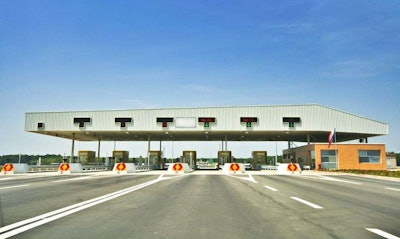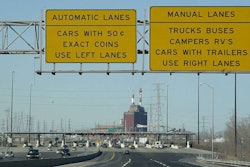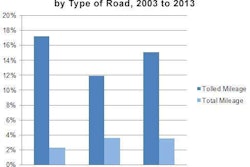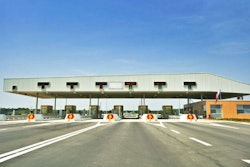
Rhode Island’s top lawmakers have proposed a ten-year plan to fund repair of the state’s deteriorating infrastructure by adding a truck-only “user fee” on 17-20 bridges.
Gov. Gina Raimondo, House Speaker Nicholas Mattiello and Senate President Teresa Paiva Weed unveiled the RhodeWorks plan at a May 27 press conference. They did not provide an estimate of what truckers would be charged, only that the new fee would generate an annual $100 million.
Electronic tolling would be implemented for trucks with three axles or more on several bridges on Interstates 95, 195 and 295; state routes 146 and 6; and U.S. Highway 10. This new fee would be used to pay off a $700 million proposed revenue bond that would be obtained to reconstruct bridges and prevent additional bridges from further deterioration.
The plan is meant to address Rhode Island’s last-place status in bridge conditions. The funding formula would add a $1.1 billion influx over nine years and a total of $4.8 billion to be allocated to infrastructure repair above current levels through 2024, according to the RhodeWorks announcement.
“Beyond bridges, RhodeWorks also reflects a new commitment toward providing increased bus and rail service as well as funding for bike lanes and accessible sidewalks,” it stated. “It includes a proposal to construct an express bus lane as part of the 6/10 interchange reconstruction, and it seeks to attract an additional $400 million in federal matching funds for public transit.”

Other northeast states on the I-95 corridor already have user fees while Connecticut is considering it. Plan proponents cited the Pennsylvania Turnpike’s $182 fee and New York’s Tappan Zee Bridge $49 toll as examples.
In Rhode Island, only the state’s turnpike and bridge authority charge a toll, applicable only for the Newport Bridge.
American Trucking Associations President Bill Graves said the state’s infrastructure crisis resulted from mismanagement and diversion of highway user fee revenue into general government expenses. “This plan to toll only trucks is quite literally highway robbery – stealing from our industry to paper over Rhode Island’s budget issues,” Graves said.
The Owner-Operator Independent Drivers Association’s Mike Matousek wrote Raimondo in response to the announcement. Truckers in northeast states already face stronger regulation, severe congestion and the “heaviest concentration of toll roads,” the state legislature director wrote.
“If tolls are the solution to our infrastructure problems, in theory the northeast corridor would have the best system of roads and bridges in the country,” Matousek stated.
Julian Walker of the Alliance for Toll-Free Interstates, formed to oppose federal moves toward removing the prohibition against tolling existing interstate lanes, noted that “singling out one type of vehicle, as some Rhode Island officials have proposed, does not make the concept of tolling existing interstate lanes any more palatable.”
Walker urged federal leaders “to find compromise on sustainable sources of transportation revenue. States like Rhode Island unfortunately have explored tolls as a funding alternative because Washington hasn’t fulfilled its obligation to fund roads. But such approaches inevitably lead to a greater financial crunch for families, businesses, and governments.” –Todd Dills contributed to this report.









